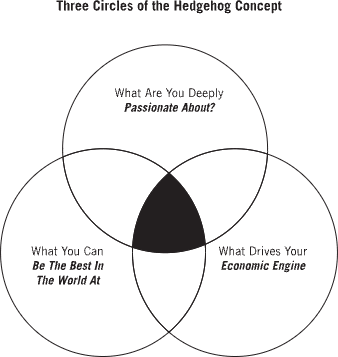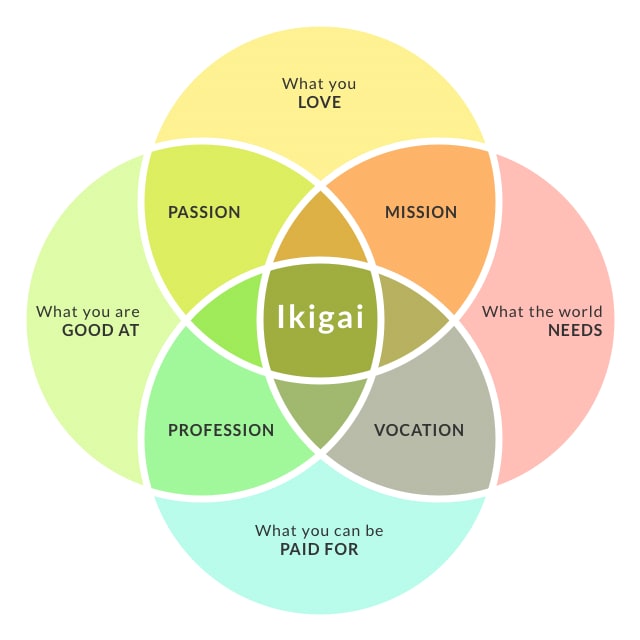Published on September 18, 2024 8:39 PM GMT
So you want to advance human progress. And you’re wondering, what should you, personally, do? Say you have talent, ambition, and drive—how do you choose a project or career?
There are a few frameworks for making this decision. Recently, though, I’ve started to see pitfalls with some of them, and I have a new variation to suggest.
Passion, competence, need
In Good to Great, Jim Collins says that great companies choose something to focus on at the intersection of:
- what they are deeply passionate aboutwhat they can be the best in the world atwhat drives their economic or resource engine

This maps naturally onto an individual life/career, if we understand “drives your economic engine” to mean something there is a market need for, that you can make a living at.
You can understand this model by seeing the failure modes if you have only two out of three:
- If you can’t be best in the world at it, then you’re just an amateurIf you can’t make a living at it, then it’s just a hobbyIf you’re not passionate about it, then why bother?
There is also a concept of ikigai that has four elements:
- what you lovewhat you are good atwhat the world needswhat you can be paid for

This is pretty much the same thing, except breaking out the “economic engine” into two elements of “world needs it” and “you can get paid for it.” I prefer the simpler, three-element version.
I like this framework and have recommended it, but I now see a couple of ways you can mis-apply it:
- One is to assume that you can’t be world-class at something, especially if you have no background, training, credentials, or experience. None of those are necessary. If you are talented, passionate, and disciplined, you can often become world-class quickly—in a matter of years.Another is to assume that there’s no market for something, no way to make a living. If something is important, if the world needs it, then there is often a way to get paid to do it. You just have to find the revenue model. (If necessary, this might be a nonprofit model.)
Important, tractable, neglected
Another model I like comes from the effective altruist community: find things that are important, tractable, and neglected. Again, we can negate each one to see why all three are needed:
- If a problem isn’t tractable, then you’ll never make progress on itIf it isn’t neglected, then you can’t contribute anything newIf it isn’t important, again, why bother?
This framework was developed for cause prioritization in charitable giving, but it can also be naturally applied to choice of project or career.
Again, though, I think this framework can be mis-applied:
- It’s easy to think that a problem isn’t tractable just because it seems hard. But if it’s sufficiently important, it’s worth a lot of effort to crack the nut. And often things seem impossible right up until the moment before they’re solved.Sometimes a problem is not literally neglected, but everyone working on it is going about it the wrong way: they have the wrong approach, or the efforts just aren’t high-quality. Sometimes a crowded field needs a new entrant with a different background or viewpoint, or just higher standards and better judgment.
The other problem with applying this framework to yourself is that it’s impersonal. Maybe this is good for portfolio management (which, again, was the original context for it), but in choosing a career you need to find a personal fit—a fit with your talents and passions. (Even EAs recommend this.)
Ignore legibility, embrace intuition
One other way you can go wrong in applying any of these frameworks is if you have a sense that something is important, that you could be great at it, etc.—but you can’t fully articulate why, and can’t explain it in a convincing way to most other people. “On paper” it seems like a bad opportunity, yet you can’t shake the feeling that there’s gold in those hills.
The greatest opportunities often have this quality—in part because if they looked good on paper, someone would already have seized them. Don’t filter for legibility, or you will miss these chances.
My framework
If we discard the problematic elements from the frameworks above, I think we’re left with something like the following.
Pick something that:
- you are obsessed with—an idea that you can’t stop thinking about, one that won’t leave you alone; even when you go work on other things for a while, you keep coming back to ityou believe is important—even if (or especially if!) you can’t fully explain it to the satisfaction of othersyou don’t see other people approaching in the way that you would do it—even if the opportunity is not literally neglected
Ideally, you are downright confused why no one is already doing what you want to do, because it seems so obvious to you—and (this is important) if that feeling persists or even grows the more you learn about the area.
This was how I ended up writing The Roots of Progress. I was obsessed with understanding progress, it seemed obviously one of the most important things in the world, and when I went to find a book on the topic, I couldn’t find anything written the way I wanted to read it, even though there is of course a vast literature on the topic. I ignored the fact that I have no credentials to do this kind of work, and that I had no plans to make a living from it. It has worked out pretty well.
This is also how I chose my last tech startup, Fieldbook, in 2013. I was obsessed with the idea of building a hybrid spreadsheet-database as a modern SaaS app, it seemed obviously valuable for many use cases, and nothing like it existed, even though there were some competitors that had been around for a while. Although Fieldbook failed as a startup, it was the right idea at the right time (as Airtable and Notion have proved).
So, trust your intuition and follow your obsession.
Discuss

